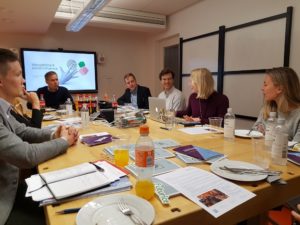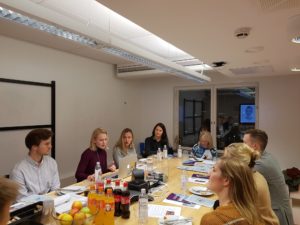Developing a more effective narrative for Europe.

“How to tell the EU’s story” was the topic of an alumni meeting in Helsinki on October 24. This second meeting in Helsinki was hosted by United Europe’s alumnus Mika Ruokonen, Head of Digital Transformation at Futurice, one of the most innovative digital consultancy companies in Finland. Futurice specialises on building digital ventures with a global potential in traditional industries. It helps companies all over Europe and abroad to develop their business in a digitalised world.
After Mika had welcomed the group and given a short overview over Futurice’s fields of activities, the eleven participants introduced themselves and explained their diverse and interesting business backgrounds. Some were alumni of Young Professionals seminars; others were friends for whom this was the first contact with United Europe and its goals. But all participants had in common that they are deeply interested in Europe and want to enhance the understanding between cultures and nations.
Then it was Eeva Raita’s turn to explain what is needed for good narrative. Eeva, Senior Service Designer at Futurice, has a PhD in social psychology plus a background in theatre. Stories, she explained, are the most powerful means of communication. This is true for entertainment and education as well as for preserving cultural heritage and implanting moral values.
If you want to create or tell stories that make a difference, you need to know how to touch the hearts and minds of people, she said. Good plots are simple and have only three ingredients: a plot, characters, and a narrative perspective.
Consideration must also be given to social influence and identity. There are other people who influence a person’s emotions, opinions and behaviour. That is why there can be no social identity without saying “us” and “them”. People always need to be aware that they are part of a particular group which is different from others. That’s obviously one of the problems the EU is currently facing: people as well as nations tend to dissociate from others which means that there is no common European feeling.
The participants complained that up to now, the EU story isn’t told in a way that would be able to take a hold of people and make them believe and trust in a successful, united Europe worth fighting for. In times of uncertainty, people long for certainty. But simple solutions are not what will solve people’s problems in difficult times.
By publishing almost exclusively negative news and stories, the media are making the situation worse. Social media, which multiply news and comments in an inflationary way, also give users the impression that everything out there is bad.
What does all that means for telling the EU’s story in a better way? Can we change this reality? Is it possible to tell the EU’s story in a way that would make a difference? What can we do? As a team, can we tell a story about Europe that would serve our own purpose?

After a lively discussion, the participants concluded that it’s both necessary and possible to create narratives for the EU’s story in different ways, either as a written story, as video, audio or drawing. They suggested United Europe could help set up a Young Professionals Seminar to bring young people from all over Europe together to create those kinds of stories in a writing hackathon. It is a suggestion that as managing directors of United Europe, we will gladly consider.


